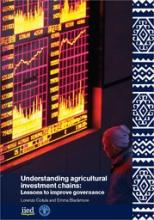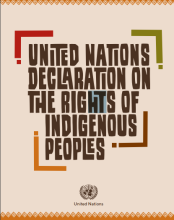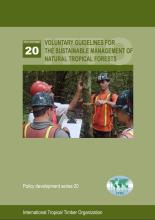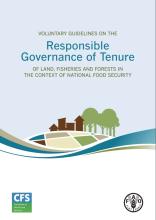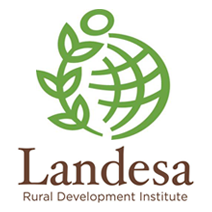Additional Resources
Think Big Go Small: Adapting business models to incorporate smallholders into supply chains
This paper tries to show the advantages - both in productivity and consumer appeal - of domestic and global companies connecting with smallholder suppliers. It draws on programme experience and case studiesin the food and drinks sector where companies aimed to deliver value for their business in ways that would also benefit smallholder suppliers.
Understanding agricultural investment chains: Lessons to improve governance
This report draws on 10 case studies of recent large-scale land deals and aims to improve understanding of the investment chains that underpin the deals, and to identify ‘pressure points’ for effective public action to ensure that investments respond to local and national development agendas and promote inclusive sustainable development. The findings of this research demonstrate the wide scope for strategies to be targeted at diverse actors, by a wide range of players, to ensure that investments uphold the Voluntary Guidelines (VGGT).
United Nations Declaration on the Rights of Indigenous Peoples
The United Nations Declaration on the Rights of Indigenous Peoples (UNDRIP) is the most comprehensive international instrument on the rights of indigenous peoples. It establishes a universal framework of minimum standards for the survival, dignity and well-being of the indigenous peoples of the world and it elaborates on existing human rights standards and fundamental freedoms as they apply to the specific situation of indigenous peoples.
Voluntary guidelines for the sustainable management of natural tropical forests
The Voluntary Guidelines for the Sustainable Management of Natural Tropical Forests constitute an international reference document for the development and improvement of national and subnational guidelines for the sustainable management of natural tropical forests. They also provide a reference on technical issues at the macro (landscape) and micro (forest management unit) scales. They set out seven principles of sustainable forest management and a total of 60 guidelines withn these principlesa, as well as implementation actions for each guideline based on best practices and existing tools.
Voluntary guidelines on the responsible governance of tenure of land, fisheries and forests in the context of national food security (VGGT)
The VGGT represent the first inter-governmental consensus on the principles and accepted standards for the responsible governance of tenure for governments, international organisations, communities, and the private sector. Their aim is to promote secure tenure rights and equitable access to land, fisheries and forests as a means of eradicating hunger and poverty, supporting sustainable development and enhancing the environment.The Guidelines serve as a reference and set out principles and internationally accepted standards for practices for the responsible governance of tenure. They allow governments, civil society, the private sector and citizens to judge whether their proposed actions and the actions of others constitute acceptable practices.
Women's land tenure framework for analysis: Land rights
This frameworks focuses on understanding the factors affecting women's land rights. It is designed to assist anyone who is interested in understanding the complex issues associated with women’s land rights: government officials, grassroots organizations, international technical advisors, policymakers, development practioners, women’s rights advocates, land rights advocates, people who are developing programs to assist women farmers, people who are concerned with food security, etc.



